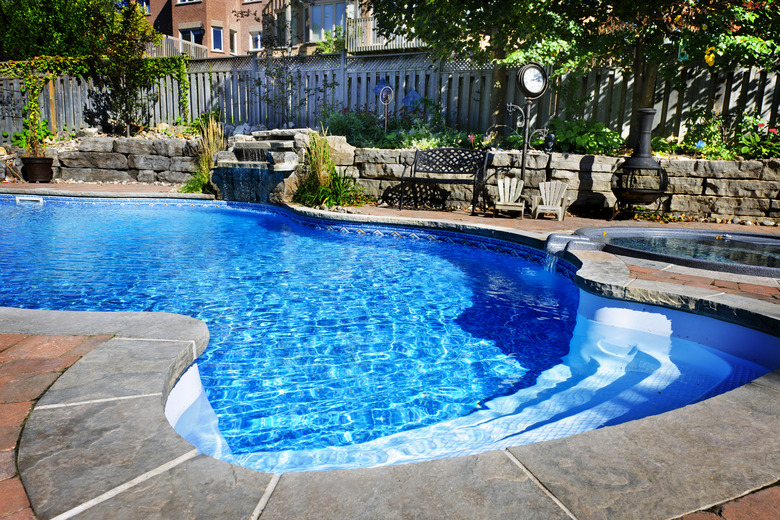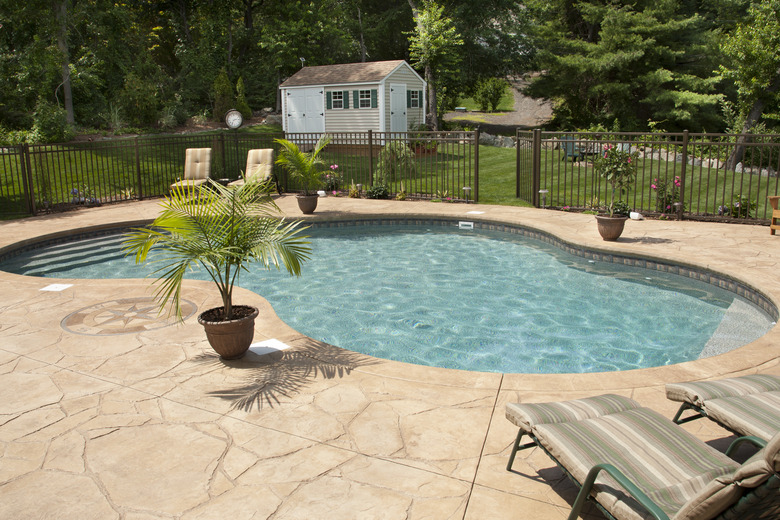Everything You Need To Know About Swimming Pool Heaters
We may receive a commission on purchases made from links.
If you plan to use your swimming pool at any time of the day other than the afternoon, you'll probably want to equip it with a pool heater, but expect the heater to have an impact on your energy bill. The extent of the impact depends on how warm you like the water, whether you want to keep the water warm 24/7 or just at certain times of the day and, of course, the outdoor air temperature. The type of heater you choose is also a major factor, and there are basically three: gas, electric and solar.
Electric heat pumps are more cost-effective than gas heaters, even though they are also less efficient than gas heaters and take longer to heat the water. This is surprising because gas appliances are usually more economical than electric ones. Heat pumps have one major drawback in that they don't work well in temperatures below 50 degrees Fahrenheit. If you like to swim in warm water when it's really cold outside, which is a luxury that doesn't come cheaply, you'll need a gas heater or a combination of gas and solar heat.
How a Pool Heater Works
How a Pool Heater Works
The operation of a gas pool heater is almost identical to that of an on-demand water heater. Water enters the heater through an inlet valve and circulates through a heat-exchange coil made of a copper-nickel alloy before exiting back to the pool. When the heater is on, a gas burner heats the coil, and because the cupronickel alloy is such a good heat conductor, the water heats up quickly as well. The burner cycles on and off to maintain the pool temperature, and the burner flame is maintained by a standing pilot (in millivolt heaters) or a piezoelectric spark (in electronic ignition heaters). An electronic ignition heater ultimately uses less gas, is guaranteed to work in windy conditions and is probably the better choice.
A pool heat pump works in a different way, its operation being paradoxically similar to that of a refrigerator. A liquid circulates through coils similar to refrigeration coils, and at some point, it passes through a tiny aperture that causes it to vaporize, which is a process that pulls heat out of the surrounding air. It continues to the heat exchanger, where it turns back to a liquid under pressure. This heats it up even more, and instead of dissipating the heat as a refrigerator does, the heat pump passes it on to the pool water, which is also circulating through the exchanger. The air must contain a minimum amount of heat for this process to work, which is why heat pumps aren't recommended for cold climates.
A solar pool heater consists of one or more solar panels that you mount on the roof of the house or somewhere in the yard. A pump circulates water through coils inside the panels, where it is heated by the sun before returning to the pool. Because solar heaters are dependent on available sunlight, which is always changing, they are generally used to supplement gas heaters or electric heat pumps to cut costs.
Comparing Pool Heating Costs
Comparing Pool Heating Costs
Even though you have to run it for longer periods, an electric heat pump is cheaper to run than a gas heater, but a solar heater with a solar pump doesn't cost anything to run, and that's hard to beat. To be able to take advantage of the heating capabilities of solar panels, however, you need direct sunlight, your property can't be shaded, the sun has to be high enough in the sky to irradiate the panels and the weather has to be clear. Also, the total surface area of a solar pool heater has to be equal to the surface area of the pool to maintain a comfortable pool temperature, which means you need a large, unsightly array.
Gas pool heaters cost between $1,500 and $3,500 depending on the size and brand, while heat pumps can range from $2,000 to $5,000 and solar heaters cost $3,000 to $4,000, but upfront costs don't tell the whole story. In one hour, a propane pool heater burns $18 in fuel, while a natural gas heater burns about $7 worth. A heat pump, on the other hand, costs about 80 cents per hour anyplace where the electric rate is the national average of 16 cents per kilowatt-hour. In other words, it costs the same to run a heat pump for seven or more hours as it does to run a natural gas heater for one hour.
Sizing Your Swimming Pool Heater
Sizing Your Swimming Pool Heater
Heat output is measured in British thermal units (BTU), which is the amount of heat required to raise the temperature of 1 pound of water by 1 degree Fahrenheit. The heating capacity you need for your pool in BTUs depends on the pool size and the average temperature, and there's a simple way to calculate it:
- Subtract the average outdoor temperature from the desired temperature of the pool.
- Calculate the pool area in square feet.
- Multiply the temperature difference by the pool area and then multiply by 12.
For example, if you have a 10 x 20-foot pool and your desired temperature is 80 degrees while the average outdoor temperature is 65 degrees — which is a difference of 15 degrees — you need a heater with a capacity of:
15 degrees x 200 square feet x 12 = 36,000 BTU
If you live in a colder climate where the outdoor temperature is only 60 degrees and you have a larger 15 x 30-foot in-ground pool, you need a heater with a capacity of 108,000 BTU (20 degrees x 450 square feet x 12 = 108,000).
Pros and Cons of Pool Heaters
Pros and Cons of Pool Heaters
When comparing different types of pool heaters, cost is an important variable, but it isn't the only one. Heat output is critical if you live in a cold climate and want a warm pool, and longevity is also important because you don't want to have to replace your heater more often than is necessary. Consider these pros and cons of the three types of heaters when making your selection:
Gas Heater Pros
- Low upfront cost
- High heat output, so no need to run continuously
- Some models have very low emissions
Gas Heater Cons
- Gas, especially propane, is expensive
- Short service life (as short as five years)
- You may need to install a propane tank
Electric Heat Pump Pros
- Long service life (20+ years)
- Relatively inexpensive to operate
- Emission-free
Electric Heat Pump Cons
- Expensive to buy
- Suitable only for warmer climates
- Heats the water slowly
Solar Pool Heater Pros
- Costs nothing to operate unless you have an electric circulation pump
- Eco-friendly
- Long service life (15 to 20 years)
Solar Pool Heater Cons
- Works only when the sun is out
- Heats the water very slowly
- The panels are unsightly and take up a lot of space.
Make Your Pool Heater Energy-Efficient
Make Your Pool Heater Energy-Efficient
The amount of heat your pool heater has to supply depends on the temperature difference between the pool water and the outside air, so if you can reduce this difference, you can save on your energy costs. One way to do this is to install a solar pool heater, but there's a much easier DIY solution that's even more effective, and that's to keep the pool covered with a solar pool cover. A solar cover works not only by absorbing the sun's energy to heat the pool water but also prevents heat loss and loss of water from evaporation. Solar rings that float on the surface of the water do the same thing less efficiently, and they are easier to remove when you want to use the pool.
Evaporation is the number one source of energy overconsumption when it comes to a swimming pool. An uncovered pool loses an average of 1/4 inch of water per day and more if the weather is particularly hot, dry and windy. Besides costing you hundreds of gallons of precious water, evaporation also cools the water surface and makes the heater work harder and longer to maintain the temperature. Even a regular pool cover is better than having no cover at all, but a solar cover actually supplies more heat, and if you install a reel to make the cover retractable and easy for swimmers to use, you'll save money in at least three ways:
- You save on gas or electricity because the pool water stays warm, so the heater cycles on less frequently and stays on for shorter periods.
- You won't have to refill the pool as often, so you save on your water bill or on your electric bill if you have a well pump.
- You may be able to get by with a smaller, less expensive swimming pool heater.


